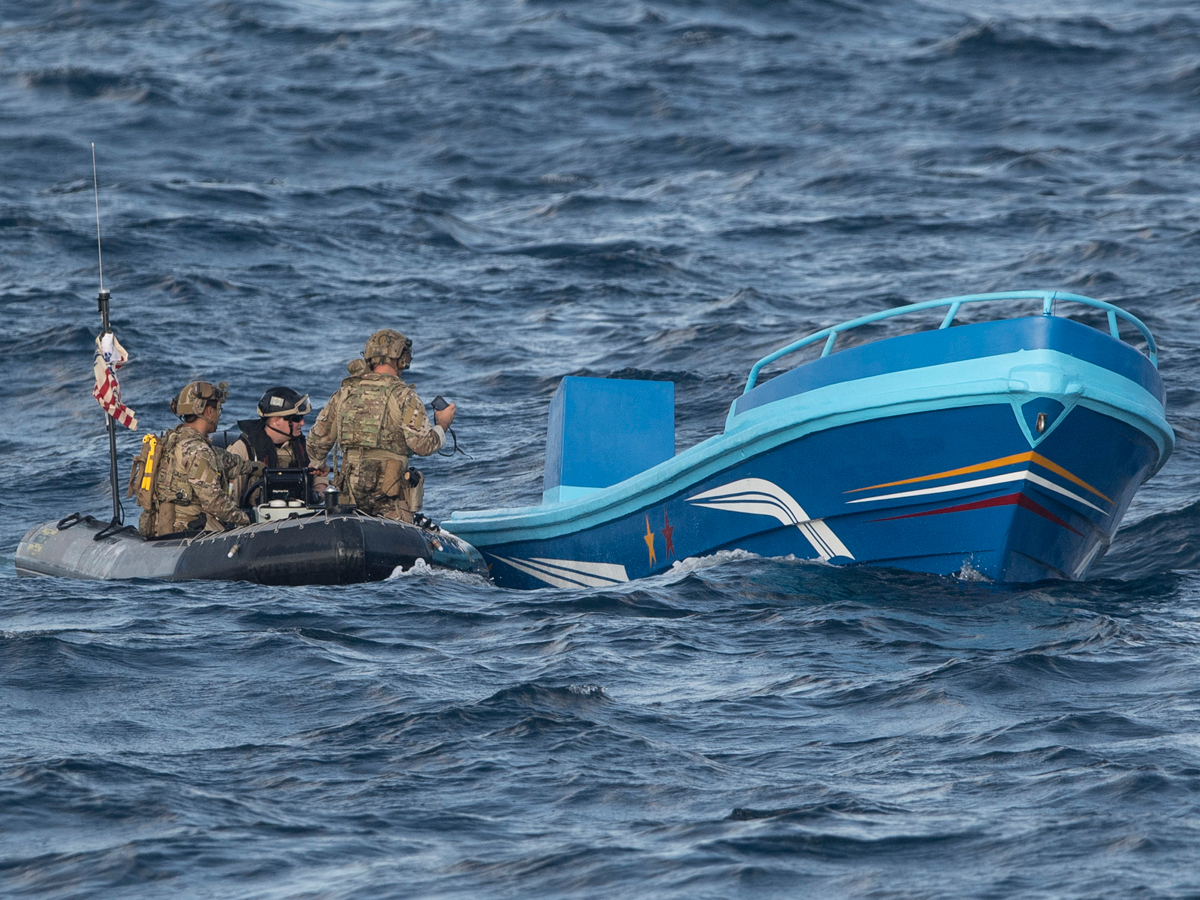Putting the ‘why’ to the ‘how’: COPS II
By Lookout Production on Feb 15, 2023 with Comments 0

This photo has been digitally altered for operational security. Royal Canadian Navy members of HMCS Yellowknife work alongside members of a United States Coast Guard Law Enforcement Detachment (LEDET) during a search of a seized panga during Operation Caribbe, March 6 2022. Photo: MARPAC Imaging Services, Canadian Armed Forces photo.
Kate Bandura, Lookout Editor — What measures should a Maritime Coastal Defence Vessel (MCDV) crew put up to deter a potential attack from pirates?
This is the type of simulated operations seven Naval Reservists from Quebec trained in during a specialized course using the Naval Bridge Simulator at HMCS Venture last December.
“This course is teaching potential Operations Officers (OpsO) to react fast to an evolving situation,” said Lieutenant (Navy) Titus Villegas, course director and lead instructor. “It refreshes the core skills of an OpsO, which will set the students up for success when they assume the position on ship.”
Titled ‘Coastal Operations Planning – Part II’ (COPS II), the course is designed for prospective Operations Officers on the Kingston-class vessels and explores equipment such as sensors and radars used during coastal operations. It caters towards Naval Warfare Officers (NWO) in the Primary Reserves who already have significant time at sea.
MCDVs go to the Caribbean Basin for drug interdiction operations. They support the navies in the Gulf of Guinea in West Africa and train them in anti-piracy, and conduct training in countering illegal activities in West Africa and the Gulf of Guinea. The platform was originally designed for Naval Reserve Sailors. Lt(N) Villegas said about a decade ago the MCDVs were amalgamated into the Regular Force fleet; combined with the pandemic, the COPS courses lost visibility.
Reserve trainees come to Esquimalt because many resources are not organic locally.
“We needed simulators such as the one in HMCS Venture, the subject matter experts are closer to the fleet, and the ships are here for field trips and tours,” he said.
COPS II is the second part of a three-part program. COPS I teaches operational planning process. COPS III is scenario-based, presenting students with skill-based modules of the Coastal Operations program. When the students are ready, they can successfully assume the OpsO position in MCDVs.
The students said COPS II helped them understand the ‘why’ to the ‘how’ they learned while on ships.
“I knew there was this one sensor on top of the MCDVs and I heard the name before, but I didn’t know what it was. I learned about its functionality in detail,” said Lt(N) Jessica Pelletier.
Lt(N) Pelletier, Training Officer at HMCS d’Iberville in Rimouski, Que., sailed with HMCS Yellowknife, HMCS Edmonton and then HMCS Nanaimo almost two years ago. She said she now understands the OpsO job much better.
“Ultimately, you mitigate risks for the CO and make recommendations,” she said. “I will use what I learned to plan and execute tasks as a Force Protection Officer.”
Lt(N) Villegas hopes the course will be a useful refresher to NWOs who haven’t been on ships for a while.
“It’s a busy job on ship, there’s a lot coming at you, and there’s a lot to absorb. I’m hoping this course would teach them the core skills of becoming the Operations Officer,” he said.
COPS II and III will be taught in Esquimalt in November 2023. As a scenario-based course, COPS III will explore three major scenarios OpsOs encounter: Search and Rescue, maritime interdiction operations, and force protection.
Filed Under: Top Stories
About the Author:





